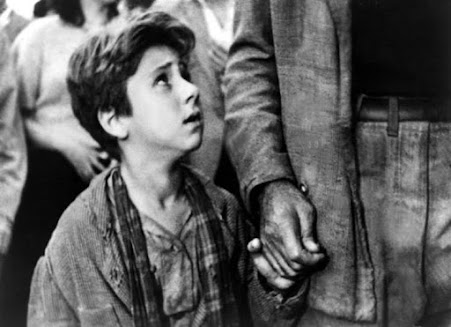👋 Hey, blog!
🎥 This week's film was Bicycle Thieves. This film perfectly represents the goal that Italian Neorealism had for films. Italian Neorealism wanted to create films that didn't feel like films. They wanted to make the audience feel like they were watching real-life captured on screen. The concepts for films were no longer supposed to be fictional, unrelatable, or unrealistic. During previous film eras, for instance, Classic Hollywood, musicals were extremely popular. The use of music was so random and everyone would know that this kind of spontaneity doesn't happen in real life. In Bicycle Thieves, however, the use of music is much more subtle. It doesn't distract the audience from the film but holds enough power to influence our emotions. This film also gave off a 'very real' feeling. Sometimes, those who tried to follow the Italian Neorealism expectations for a realistic film, tried too hard to make their film appear real that, in the end, it doesn't feel real at all. This film doesn't make that mistake since they used real, struggling people instead of professional actors and utilized location shooting instead of filming in a studio.
👍 This film is very relatable. Most people go through the struggle of finding out that their bicycle has been stolen, and have experienced the struggle of being unemployed. Children have also experienced seeing their parents going through rough times and making questionable decisions. The film also captures the reality of how hard it is to escape your social status since Ricci had tried to help his family escape poverty but, unfortunately, ran into some bad luck.
🥺 This film makes viewers feel many emotions. At the start of the film, viewers would feel empathy since they would know how it feels to not be able to find a job and be broke. Then, they would feel happy because Ricci had finally gotten employed. Knowing the title of the film, viewers would feel anxious thinking that a thief would steal the bike soon. Viewers would also feel angry and upset when they saw how Ricci's bike was stolen. Throughout the majority of the film, the viewers would feel sad for the kid who was witnessing his father go a bit wild while trying to find his bike. By the end, viewers would feel a kind of bittersweet feeling since Ricci had been caught stealing the bike but was let off the hook since they had noticed his son watching this all play out. I honestly felt annoyed with how no one helped Ricci when his bike got stolen, yet everyone suddenly appears and captures him when he tried stealing a bike. Then again, I understand that Ricci got caught since he isn't a true criminal and doesn't actually know how to steal properly.
👀 I recommend this film! You'll get to see a cute face and a relatable story. It'll keep you on your toes and you will be in your feels by the end of the film.
~~~~~~~~~~~~~~~~~~~~~~~~~~~~~~~~~~~~~~~~~~~~~~~~~~~~~~~~~

The music does a really good job of cuing the viewer how to feel. Whatever Ricci was feeling, the music echoed it helping to evoke even more of an emotional response in the audience. I also agree it was frustrating seeing almost no one help when Ricci's bike was stolen, but when he steals a bike so many people appeared out of nowhere to help catch him.
ReplyDeleteI like your observations about how film gives the feeling of being real rather than scripted and how it works to create a feeling of being "relatable". I think its interesting that it used the music in such a conventional way to cue an emotional response but at the same time the film seems so "real" that it seems to transcend previous cinematic representations.
ReplyDelete